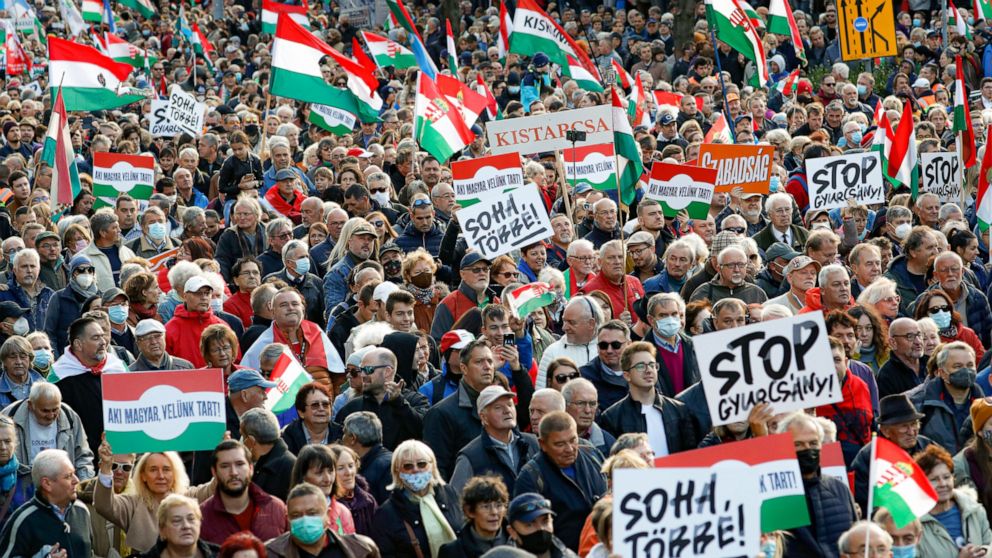Tens of thousands in Orban rally in Hungary capital Budapest
Tens of thousands of supporters of Hungarian Prime Minister Viktor Orban and his right-wing government marched in Budapest on Saturday in a demonstration of unity behind the populist leader’s contentious policies
BUDAPEST, Hungary — Tens of thousands of supporters of Hungarian Prime Minister Viktor Orban and his right-wing government marched in Budapest on Saturday in a demonstration of unity behind the populist leader’s contentious policies that have led to challenges to his power both in Hungary and the European Union.
The rally was dubbed a “Peace March” and participants gathered along the western bank of the Danube River and departed across Liberty Bridge, winding through downtown Budapest toward the site of a rare public speech that Orban delivered to his supporters.
Orban painted a dark picture of what Hungarians could expect if he is defeated in a national election scheduled for next spring, expected to be the most serious challenge to his power since he took office in 2010.
Orban enumerated his government’s economic achievements, and blasted Hungary’s previous socialist government which he accused of leading the country to financial ruin.
“It took us years to rectify the destruction of the left wing,” Orban said. “The socialists and their leader have remained hanging around our necks.”
The march was organized by nongovernmental organization Civil Unity Forum, an active promoter of the policies of Orban’s Fidesz party, which has dominated Hungary’s parliament with a two-thirds majority since 2010.
The group’s chairman, Laszlo Csizmadia, told The Associated Press before the march departed that the event was meant to demonstrate Hungary’s sovereignty to the EU, which he said had “undeservedly” attacked Hungary in recent attempts to reign in what the bloc sees as democratic backsliding.
“We think that we have a right to state our opinions in the long term in the European Union,” Csizmadia said.
Orban also took aim at the EU, saying that Brussels had conducted a sustained attack on Hungary over its economic and immigration policies that have put his government at odds with the bloc’s leaders.
“Dozens of prime ministers have attacked Hungary. We are still here, but who can remember even their names?” he said.
Laszlo Csendes came to the march from Veszprem, a city 75 miles (120 kilometers) southwest of Budapest. He said Orban’s performance since 2010 had led to Hungarians “prospering” and an improvement in economic conditions.
“There are new jobs, you’ve just got to look around,” Csendes said. “There’s money for everything, and for everyone.”
Orban’s staunchly anti-immigration government faces increasing pressure both in Hungary and internationally. The EU, of which Hungary is a member, is considering imposing financial penalties on the country over concerns that Orban has eroded democratic institutions and the rule of law in pursuit of what he calls an “illiberal democracy.”
At home, Hungary’s six largest opposition parties have vowed to put aside ideological differences and form a coalition to challenge Orban’s party in upcoming elections.
The parties argue the unity strategy is the only way to overcome a media environment dominated by government-aligned outlets and an electoral system unilaterally authored and passed by Fidesz which they say gives the ruling party an unfair advantage.
The six-party opposition coalition concluded a primary race last week where voters elected independent candidate Peter Marki-Zay to be Orban’s challenger for prime minister on the unity ticket. A self-described conservative Christian, Marki-Zay has argued he can appeal both to Hungary’s liberal voters and disaffected Fidesz supporters.
At a joint demonstration of the opposition parties which drew several thousand supporters on Saturday, Marki-Zay told the AP that he would lead the coalition in doing away with corruption, crackdowns on the media and abuse of government institutions he says has occurred under Orban’s rule.
“Our basic goals for all of us, left and right, is for Hungary to be a democracy, to be governed by the rule of law in a market economy and as part of the European Union,” Marki-Zay said.
But some participants in the pro-government Peace March, many holding signs critical of the opposition movement, expressed anger at the coalition’s ambitions to defeat Orban’s government.
“I don’t think they are able to govern, they don’t have any concepts,” said Judit Nemeth, a marcher from Budapest. “They only have one goal, to oust Orban, who I think is Europe’s best politician.”
![]()


